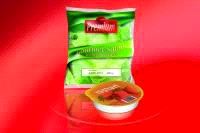Consumables
Sun Chemical Launches Newest Evolution of SunLase Laser Marking Solutions

Monday 19. May 2014 - Demos of SunLase Laser Marking Solutions will be on Display at Interpack 2014
At Interpack 2014, Sun Chemical is launching the newest evolution of its SunLase laser marking solutions, a coating that enables brand owners to add information to both secondary and primary packaging information after the filling and closure of the pack, whether for practical supply chain purposes or as a late stage pack differentiator.
The SunLase solution prints a transparent or tinted coating onto a packaging substrate during the printing process. After the packaging has been sealed, variable coding graphic information, such as barcodes, QR codes, and “Use By” dates or branding, can be created using a low power CO2 or fibre laser to change the colour of the patch to black where marked, with no risks to the packaged product.
Eric Dejean, Product Manager, Water Based Products (Europe) Sun Chemical said: “In today’s market place, modern supply chain management and track-and-trace requirements mean that most packs must carry identification markings, such as barcodes. Additionally brand owners are finding that consumers want complex on-pack information about ingredients, dietary information, usage guidelines, recycling. With SunLase laser marking solutions, brand owners now have the flexibility to add information to packaging at the latest possible stage of the supply chain. This avoids the potential cost implications of more flexible, shorter-run package production and allows their packaging to become more adaptable to what consumers demand.”
Visitors of Stand C10/Hall 7a during Interpack 2014 can see how SunLase works first-hand with live demonstrations provided by Videojet, a leading laser manufacturer. The demos will show how a collection of images, such as QR codes, barcodes, logos, text, and serial numbers, will appear on various substrates, including corrugated board and film.
SunLase is compatible with a wide range of substrates and printing processes and lends itself to the application of regular product information, such as ingredients and nutritional information, barcodes, dates, and personalisation. It can also be used for cross media devices, such as QR codes, to enable consumers to access more in-depth product information, or to participate in brand communities and individualised games and competitions.
Lasering has advantages over current inkjet solutions, delivering a higher quality image, removing the cost and complication associated with additional labelling, removing solvents and ribbons from the process, and involving a low impact technology suitable for use with substrates that could be damaged in other marking processes. Additionally, there is no burning, etching or ablation on the pack.
Brand owners can also add complex market or destination-specific information or language versions at the last possible stage, overcoming the need to hold inventory of printed packaging in multiple languages, or the challenge of accommodating multiple languages occupying valuable space on the package.
